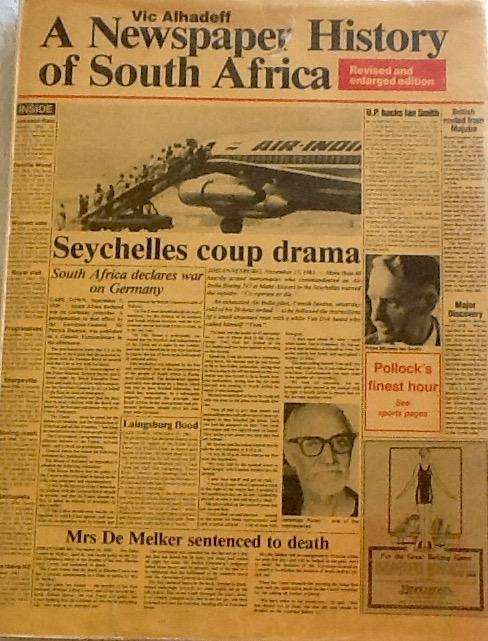
Newspaper History of South Africa
Check my rate
| Main centres: | 1-3 business days |
| Regional areas: | 3-4 business days |
| Remote areas: | 3-5 business days |

| Main centres: | 1-3 business days |
| Regional areas: | 3-4 business days |
| Remote areas: | 3-5 business days |
Hardcover 1985
Second edition
Newspapers are the grist to daily living, you have a subscription, buy one at the local cafe or fall for the sales patter of the newspaper man or woman on the street corner. I can't live without a newspaper. My expectation is that a good daily newspaper will report on daily happenings in politics, international affairs, business and sport. There may be some editorial analysis and a favourite columnist worth reading. I look for balance, accuracy, sobriety and interesting stories in a newspaper. There is no better way to start the day than with a cup of coffee and an early morning newspaper read. For brain stimulation I turn to the crosswords and sudoku. For fun there are the cartoons and comics.
But is newspaper history? Not exactly. A newspaper is current, immediate and topical. Newspapers reflect the ideology of the proprietor or the stance of the editor. Different newspapers appeal to different segments of the population. News is what the editors decide will sell the paper.
There is nothing as stale as yesterday's news and an old newspaper is best used as a wrap for hot fish and chips. Who knows what news from today's newspaper will still be readable and of interest in half a century. But there is an historical use for old newspapers... they become the stuff of history and over time become a rich archival source material for the historian looking back on the past and seeking the sensational, the quirky or the curious. Old newspapers provide a mine of information.
Of course keeping old newspapers can get out of hand. They are meant to be read and recycled. I find though that with all those interesting stories, it can be hard to throw out a good newspaper story. Maybe I shall need last week's news gem next week. Solution: start a newspaper cuttings file but that needs a filing system and an index and you have to keep the source and date your cutting if you are a true historian building an archive. Often I will save news clips but after six months of a growing dusty mound, they too have to be turfed. I once had a mad academic colleague whose sure sign of insanity was shown in his insistence of taking back to his home country his tin trunk of South African news clippings because he had lived through the momentous changes of turbulent times and here in his trunk was his newspaper history. University repatriation allowances did not cover a trunk of news cuttings!
Don Nelson has solved the problem for mad professors who want to hang onto the news in the various editions of A Newspaper History of South Africa. HIs newspaper histories go back to 1976 when the first edition came out and the stories of ordinary men and women who "made history" in a newspaper headline or report were so helpfully captured. That book has now become a collectable item of Africana because it is a period piece and is quite expensive on antiquarian book sites.